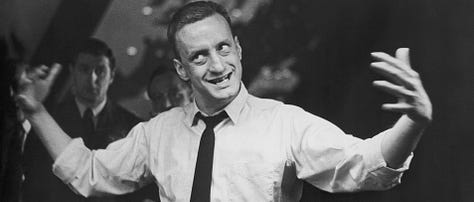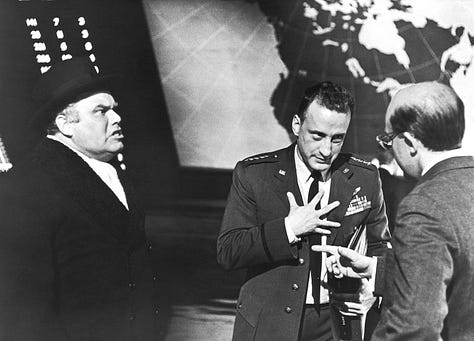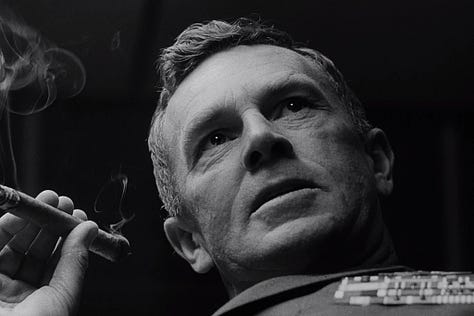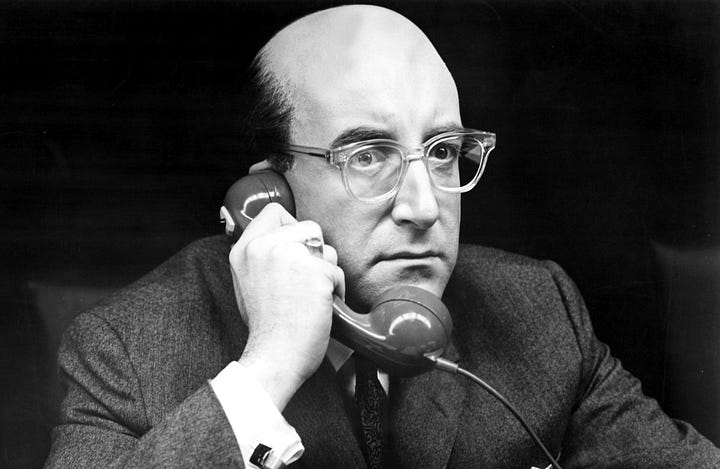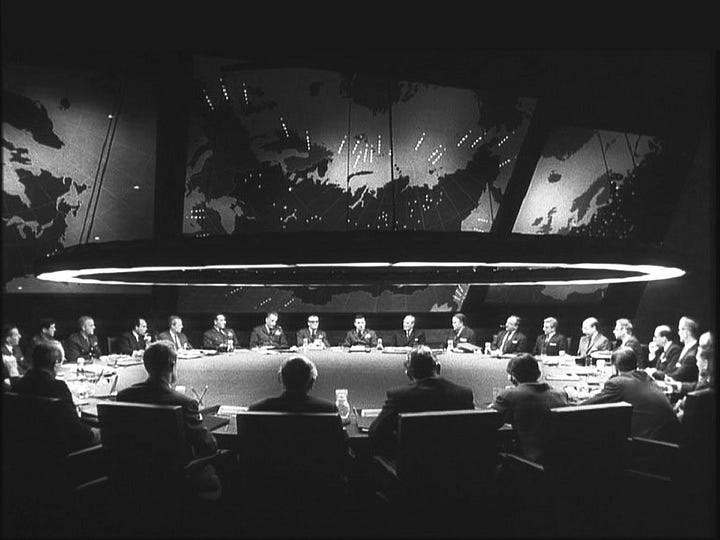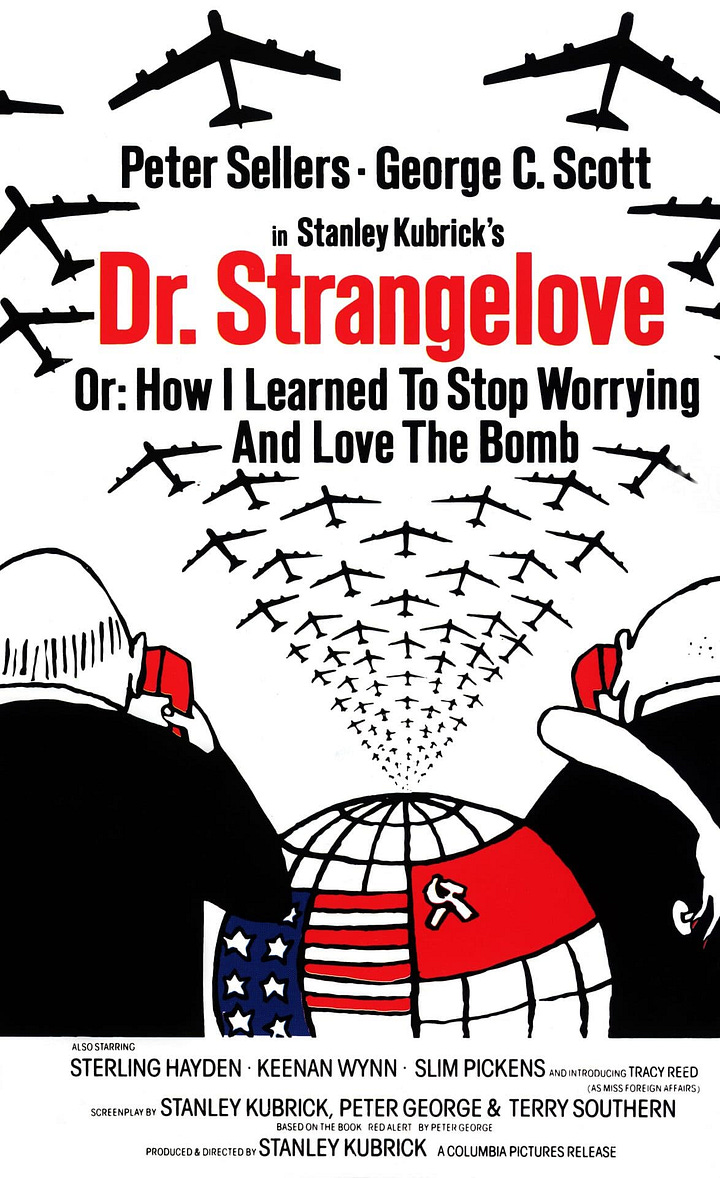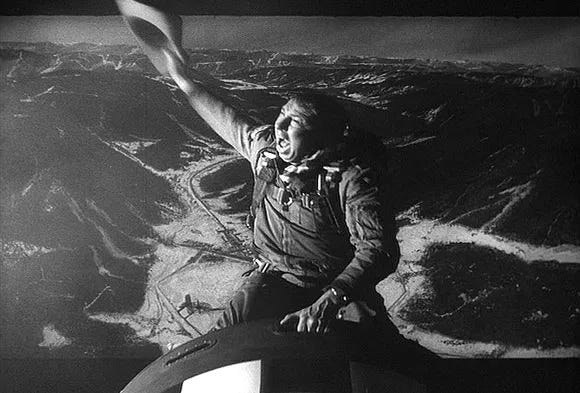DR. STRANGELOVE, OR: HOW I LEARNED TO STOP WORRYING AND LOVE THE BOMB (1964)
Film of the Day #202
DR. STRANGELOVE, OR: HOW I LEARNED TO STOP WORRYING AND LOVE THE BOMB
1964 • Stanley KubrickCast: Peter Sellers, George C. Scott, Sterling Hayden, Keenan Wynn, Slim Pickens, Tracy Reed, Jack Creley, Peter Bull, James Earl Jones, Shane Rimmer
Screenplay: Stanley Kubrick, Terry Southern, Peter George; Based on Red Alert by Peter George
Cinematography: Gilbert Taylor
Music: Laurie Johnson
Producer: Stanley Kubrick
Columbia Pictures
Gentlemen, you can't fight in here! This is the War Room.
The world teeters on the brink of nuclear annihilation. A rogue U.S. Air Force General, Jack D. Ripper (Sterling Hayden), fearing a Communist conspiracy to steal our… um, fluids, orders a nuclear strike on the Soviet Union. The situation escalates as the U.S. President, Merkin Muffley (Peter Sellers), along with his advisors, desperately tries to avert the impending catastrophe. Meanwhile, an RAF officer, Captain Lionel Mandrake (also Sellers), attempts to stop Ripper's madness. As the clock ticks down, tension rises in the War Room, where politicians and military officials grapple with the absurd inevitability of nuclear war. The President and his war chiefs attempt to stop nuclear annihilation as a B-52 bomber, commanded by the gung-ho Major T.J. "King" Kong (Slim Pickens), hurtles toward its target: the Soviet Union. The fate of humanity hangs in the balance, and amidst the chaos, Dr. Strangelove (Sellers yet again), a former Nazi scientist, advises the President on how to handle the situation should the worst happen.
This pitch-black comedy, the witty and dark counterpart to the intense drama of Fail-Safe, delves into the absurdity of Cold War paranoia and the terrifying consequences of human error in the age of nuclear weapons. The film skillfully weaves multiple storylines together, like the efforts of the level-headed Captain Mandrake, who attempts to stop the paranoid General Ripper. Meanwhile, inside the War Room, a cast of characters including the war-mongering General Buck Turgidson (George C Scott) and the Soviet ambassador, Alexi de Sadesky, engage in rapid-fire dialogue that oscillates between the terrifying and the absurd.
Despite its relentless humor and sharp wit, the film delves into the gravest aspects of human existence, namely the catastrophic consequences of nuclear warfare. Stanley Kubrick's masterful direction and Terry Southern's brilliant screenplay infuse the movie with biting satire. The film navigates the thin line between farce and tragedy, delivering laughs while provoking profound contemplation. The film provokes laughter in the face of annihilation, with incisive commentary on the political and military absurdity of the Cold War era.
Peter Sellers' performance is iconic, showcasing his unparalleled versatility as an actor. Playing three distinct roles: President Merkin Muffley, Captain Lionel Mandrake, and the titular Dr. Strangelove. As President Muffley, Sellers presents the quintessential image of a calm and collected leader, navigating the chaos but succumbing to exasperation. Mandrake, the rational and composed RAF officer, is a testament to his ability to infuse even the most insane situations with subtle humor and wit. And then there's Dr. Strangelove, a character of eccentric brilliance and unsettling charm. With the aid of costume, make-up, and editing, Sellers seamlessly switches between these roles, each with its own unique quirks and nuances, almost fooling you into thinking they are separate actors. In fact, if you are unfamiliar with Sellers, you might even think they are.
His impeccable comic timing is key to the film's humor. But it’s not just in the wacky Strangelove that he gets laughs. The one-sided phone conversation between President Muffley and the Soviet Premier is a testament to Sellers' skills, as he effortlessly delivers lines that evoke laughter while maintaining the seriousness of the situation. Sellers is able to deliver both quick wits as the President and erratic ridiculousness as Strangelove. Sellers apparently improvised Dr. Strangelove's brief uncontrollable lapses into giving the Nazi salute, which is just chef’s kiss perfection.
George C. Scott's comedic performance stands as a testament to his exceptional talent as an actor, transcending his reputation as a serious and dramatic performer. Despite not being known for comedic roles, Scott brilliantly portrays General Buck Turgidson, infusing the character with a unique blend of absurdity and intensity. His portrayal of the overzealous and hawkish military officer is marked by impeccable timing, sharp delivery, and a magnetic presence on screen. His exaggerated expressions, bombastic delivery, and wild gestures elevate Turgidson into a memorable comic figure, contributing significantly to the film's darkly comic tone. But this specific performance wouldn’t necessarily have been how Scott would have played Turgidson. Kubrick tricked Scott into giving this zany performance by convincing Scott to do exaggerated and absurd "practice" takes, assuring him that these would merely serve as warm-ups and would never make it into the final cut. However, much to Scott's surprise, Kubrick DID use these over-the-top takes in the film. Scott vowed to never work with Kubrick again.
Dr. Strangelove outlining his plan for post-apocalyptic human survival is a striking commentary on the dangers of male-dominated decision-making and the absurdity of their proposed solutions. Strangelove, the former Nazi scientist turned U.S. government advisor, presents his vision for repopulating the world in an underground bunker. His proposal includes an elaborate and surreal plan where a carefully selected group of people would survive in a gender-imbalanced society. To ensure the survival of humanity, Strangelove suggests a ratio of ten women to each man, emphasizing the importance of selective breeding and encouraging polygamous relationships among the survivors. This scene serves as a scathing critique of the patriarchal power structures and the misguided confidence of men in positions of authority. By portraying the male characters as shortsighted and driven by primitive instincts, Kubrick emphasizes the recklessness of entrusting the fate of the world to such individuals. The scene underscores the film's broader message about the inherent dangers of nuclear warfare and the folly of relying on a handful of men to make decisions that could impact the entire planet. I mean… how else can you explain Slim Pickens mounting a giant phallic nuclear bomb and riding it all the way down to nuclear apocalyptic destruction?
Mein Führer! I can walk!
Notable Awards & Accomplishments
AFI’s 100 Films: #26
AFI’s 100 Comedies: #3
4 Academy Award Nominations: Best Picture, Best Director, Best Actor (Sellers), Best Screenplay
Streaming: Not currently streaming
Digital Rental/Purchase: Available at most major digital retailers
Physical Media: Available on 4K, Blu-Ray and DVD. Part of the Criterion Collection.
